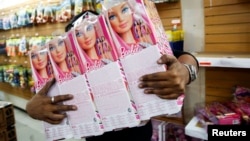In Venezuela, Christmas has begun in November.
President Nicolas Maduro has launched a plan dubbed “Operation Merry Christmas” to lower the cost of toys, clothes and appliances for shoppers, potentially boosting his slumping poll numbers as the country struggles with a weakening economy.
With soldiers selling subsidized holiday food and some 27,000 government inspectors leaning on private businesses to cut prices, Maduro hopes to take the edge off the country's 63 percent inflation during the Christmas shopping season.
That may help him improve approval ratings that dropped to 30 percent in September, according to pollster Datanalisis.
The government's price control czar Andres Mendez kicked off the holiday shopping season earlier this month with orders that businesses keep prices down and warnings that merchants must not charge more than 30 percent markup on any item.
Within days, shops were slashing prices and soldiers were organizing Christmas 'fairs' full of subsidized goods from food to electronics.
One throng of people gathered outside a downtown Caracas toy store to pick up cut-rate Barbie dolls that had been marked down by nearly 80 percent to 553 bolivars, only around $5 at the black market exchange rate.
“I'm buying six Barbies before they run out,” said Carmen Suarez, a mother of two who got permission to leave work. “They said I could buy six as long as I didn't buy the same model twice.”
The strategy has worked for Maduro before. A year ago, he enjoyed a sharp jump in poll numbers after a theatrical wave of forced price reductions that boosted the Socialist Party's standing in the subsequent municipal elections.
Maduro and his ministers accuse the opposition, together with business leaders, of leading an 'economic war' to artificially spur consumer prices and create product shortages.
His detractors say the country's inflation rate of more than 60 percent, the slowing economy and nagging shortages of staple goods symbolize the failure of late socialist leader Hugo Chavez's state-led economic model.
Even those benefiting from the state's largesse are tired of the now-customary long lines.
“The government has good intentions, but they need to find a different way to do this,” said Alberto Monsalve, 36, who waited overnight in a line to buy a laptop computer for 8,300 bolivars, less than $75 at the black market exchange rate.










